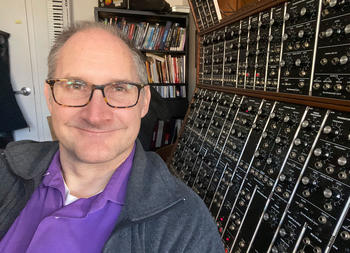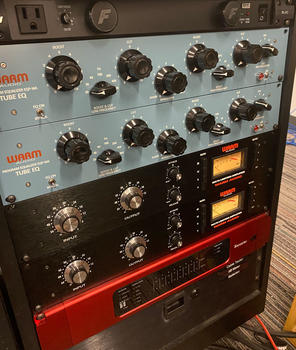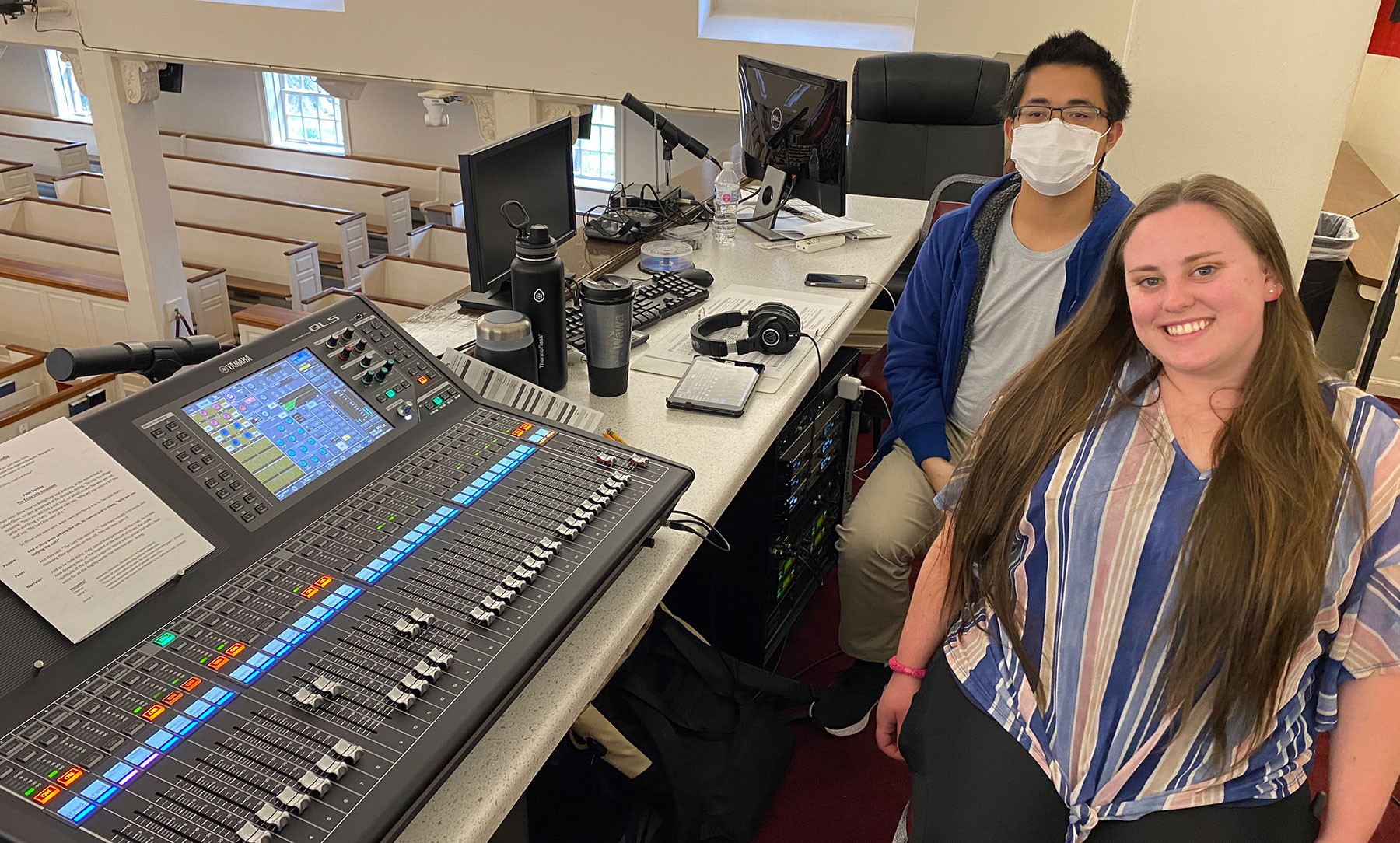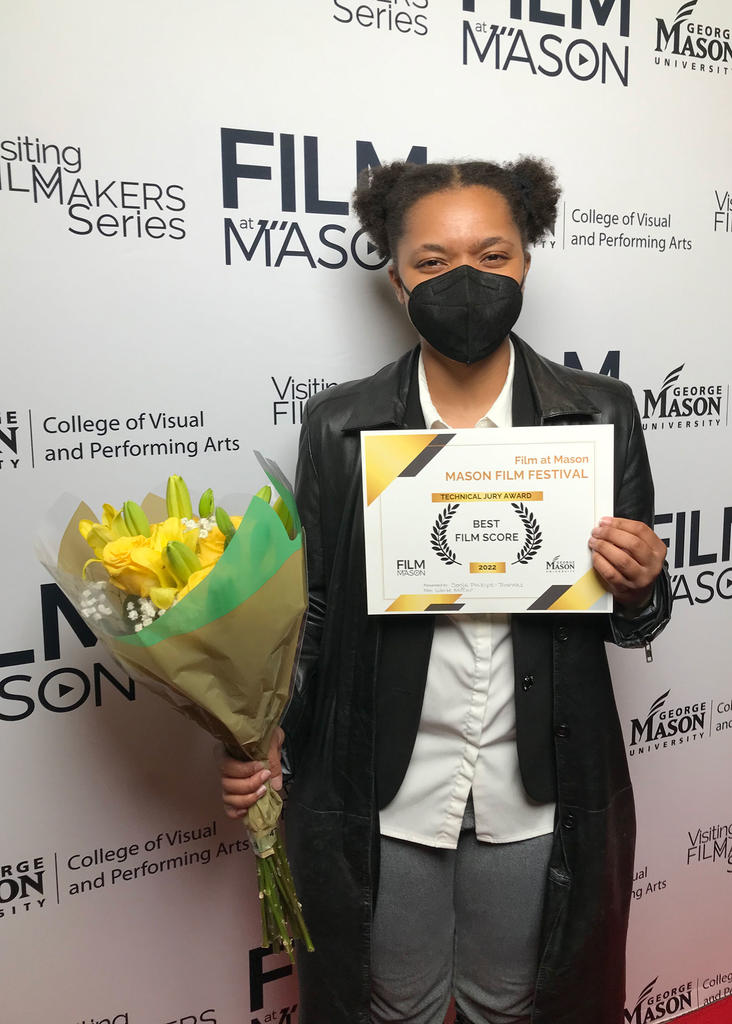Studying the intersection of modern technology and music making
Music and Technology have a long and fruitful relationship. Old and new technology is woven into various aspects of our musical heritage. Our program provides students with a strong grasp of the technical and theoretical aspects of music, audio recording, and production.

Director of Music Technology - Dr. Robert Gillam
Music Technology is a field of study and practice characterized by integrations and fusions of musical and technological knowledge and skills to produce work for various artistic, commercial, research, educational, and other purposes. In this field, digital and emerging technology serves as the primary tool for musical and music-related work. Such music-centered work includes, but is not limited to, production, recording, manipulation, systems design, installation, software and hardware development, and the wide variety of audio fields such as concert and event, film, game, and audio design. The Dewberry School of Music’s close proximity to other areas within the College of Visual and Performing Arts promotes an environment of trans-disciplinary collaboration.
Degree Programs
The Bachelor of Music with a Concentration in Music Technology
This degree is intended to produce professional competence in the integration of music and technology. It provides students with a strong grasp of the technical and theoretical aspects of music recording and production. It acquaints them with the historical and social context of recorded music and electronic music in all of its aspects, from the avant-garde experiments to current styles of modern electronic popular music. Students develop the skill and technique to produce substantial new creative works in electronic composition, music recording, and audio production. As part of this degree program, students will take part in internships within their field at venues such as the Grammy Award-winning Bias Studios, located close to campus. Music Technology students in the BM degree program can choose from one of the following emphases:
- Electro-Acoustic Composition - For composers, songwriters, producers, and others interested in creating original music
- Recording - For students who want to focus on the recording, mixing and/or mastering processes for audio
- Engineering - For students pursuing a double degree in a STEM field or for students interested in the intersection between music and the STEM fields
The Bachelor of Arts with a Concentration in Music Technology
This degree provides students with a strong grasp of the technical and theoretical aspects of music recording and production within the context of a broad liberal arts education. It acquaints them with the historical and social context of recorded music and electronic music in all of its aspects, from the avant-garde experiments to current styles of modern electronic popular music. Students develop the skill and technique to produce substantial new creative works in electronic composition, music recording, and audio production.
Music Technology Minor
This minor is open to majors from throughout the university who seek to expand their knowledge and skill in this area of study.
The Audio Lab and Bean Collection

The Audio Lab combines cutting-edge digital technology with some of the best vintage equipment from the past. The studio acts as a teaching space, lab, and re wording studio for the students enrolled in a Music Technology course or degree program. Students have access to a large catalog of equipment use for their music making. The equipment installed in the studio are some of the key pieces of technology that shaped music from the 1960’s through to the present day.
Much of the equipment in the studio came from a generous gift from Mrs. Bean in memory of her son Bernard. The Bean collection encompasses a wide variety of vintage keyboards, drum machines, modular synthesizers, and recording equipment.
Please visit the Bean Collection page for a complete list of the items.
Internship Opportunities
George Mason University’s strategic location in the Washington D.C. metro area provides a wide array of internship opportunities in the field of music technology. Students who pursue internships find that the accompanying real-world, hands-on experience is invaluable to their education. As interns our students have worked as studio engineers, sound designers, audio editors, composers, A/V systems installers, live sound engineers and more.

Below is a list of some of the internship placements our students have taken part in:
Study Applied Music Technology
All music majors are required to audition and take applied lessons on their primary instrument. Many of the students in the Music Technology program are proficient in a traditional instrument (e.g. piano, voice, saxophone, etc.) and take part in the Music Technology program on these instruments. However, there are an increasing number of musicians that do not have traditional music backgrounds, but are highly skilled at making music electronically. The Dewberry School of Music is excited to be able to offer an option for students who fit this description.
Students in the Music Technology program have the option to declare their electronic instrument (computer+software+controller) as their primary instrument for fulfilling their applied lesson requirements.
The goal of the Applied Music Technology program is to expand their skills, developing electronic musicians who are able to perform in a range of musical settings. These skills include:
- Applying knowledge of scales, harmony, and rhythms to create musical ideas
- Performing solo, and in small and large ensemble settings
- Taking on melodic, harmonic, rhythmic, and textural roles as well as arranging, mixing, remixing, live-looping and improvising
- Developing effective electronic performance strategies
- Learning to use a variety of performance controllers
- Working with a variety of synthesizers, drum machines, samplers and effects processors
- Developing and configuring responsive, musically expressive electronic performance systems
To audition for the Applied Music Technology area, please see the auditions page.

Music and Film double major, Sonja Phillips-Thomas (2023), won an award for Best Film Score at the 2022 Mason Film Festival.
